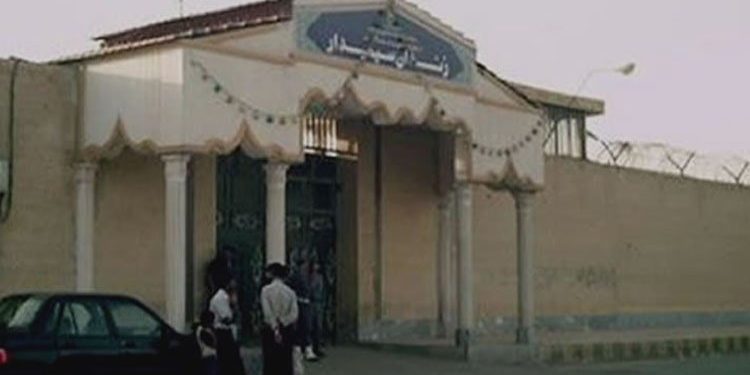According to a report received from the Women’s ward of Sepidar Prison, inmates held in overcrowded wards are at increasing risk of a health catastrophe as the Covid-19 pandemic sweeps through Iran’s jails.
As the temperatures soar to 50C in the city of Ahvaz in Khuzestan Province, accounts by inmates provide a glimpse of conditions in this facility.
According to a credible source, despite the city being among the nation’s hottest, women held in Sepidar Prison do not have air conditioners. The only air conditioner at the women’s ward is broken and the inmates do not even have a fan. Prison officials have not yet taken any measures to repair the air conditioner. The situation is made worse sometimes by water cut off.
The wards of this prison are overcrowded, and the inmates are jammed into small cells designed for far fewer people which has led to the prevalence of many diseases among the prisoners.
The source said a coronavirus outbreak that recently infected more than 50 of inmates at the prison has sparked fear among prisoners’ families that the deadly virus may spread further in such conditions.
The quarantine ward, which houses coronavirus patients in the prison, is separated from other inmates by only a few bars.
Ill prisoners share the same place for outdoor time as other prisoners.
Since the outbreak of coronavirus in Iran became publicly known in February 2020, many have been raising concerns for the wellbeing of those jailed in Iran.
Many human rights activists, prisoners and their families have made urgent calls for international investigators to visit prisons in Iran and see the conditions that inmates are being kept in.
A female prisoner who had been in the women’s ward of Sepidar Prison for a few days described its appalling conditions.
Unbearable Living Conditions in Women’s Ward of Sepidar Prison
The female prisoners in the Sepidar Prison of Ahvaz are deprived of the most basic needs of a decent life. The prison cells are full of lice, insects, and cockroaches.
The prisoners who have to sleep on the ground are in a worse situation. The bathroom’s sewages have problems.
The blankets given to prisoners are dirty and unusable. On many days of the week, the women’s ward health center has no doctors or even nurses.
Prison meals are inadequate and extremely poor in terms of quality. Usually the prison’s food has some kind of scraps of junk in it.
Suicide and self-injury among these women are heavily prevalent, as the women hope that after self-injury, they will be transferred to the health center so they can stay in a better condition for a few days or ultimately die.
Lack of initial medical treatment
One of the girls in prison suffered a severe seizure and fainted on the floor of the bathroom, falling on her head. The prisoners banged on the cell’s door for ten minutes until finally a woman, who was neither a doctor nor a nurse, came inside and only looked at the girl who had fallen in the bathroom and splashed some water on her face. However much the prisoners shouted and begged for her to be taken to the health center to take x-rays of her swollen head, but the woman only said, “don’t worry she won’t die” and walked out. Death in this prison is a routine and insignificant event.
Women whose sentences are completed
The women in this prison often do not have anyone outside the prison to pursue their case. Although their sentences have been completed, many women remain under such conditions in prison, since they do not have anyone outside who can obtain a release letter for them.
A girl, who was sentenced to one year of imprisonment and three months had passed from the end of her sentence, was still in prison because she did not have anyone outside pursuing her release, and even the prison aid worker did not help.
Sepidar Prison in Ahvaz was established in 2009. The prison area is 700 square meters. Prison conditions are so bad that when Massoumeh Ebtekar, the Vice President for Women and Family Affairs, visited the women’s ward in Sepidar Prison in December 2018, they could not publish any photos of her visit to the women’s ward, women’s beds, the floors of the ward, and the bathrooms. Only a picture of the prison’s kitchen was released.
Female prisoners in the Sepidar Prison in Ahvaz are living in an inhuman and unbearable condition and experience double isolation. Such conditions will forever leave irreparable damage to the body and soul of these women.











